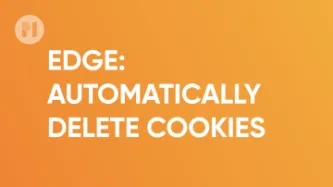Search
Content type: Guide step
Ad Blockers aim to prevent your browser from connecting to Ad servers and loading ads on webpages you are visiting. They can also block some parts of webpages that likely display ads. Blocking ads and connections to ad servers can help minimise the amount of data that the Adtech industry collects about you for targeted advertising.
Warning: Using an ad-blocker may cause some pages to display incorrectly or not at all. This guide also shows how you can modify the Ad Blocker's behaviour to allow…
Content type: Guide step
DNS level content blocking prevents your device from connecting to known domains that will serve you unwanted ads and track you across all different apps and browsers on your device.
DNS or 'Domain Name System' is basically the 'phone book for the internet'. On the internet, all your requests to access websites are routed to IP addresses. Since IP addresses are sets of numbers and hard to remember, we usually address hosts by their much easier to remember host-name (e.g. privacyinternational.…
Content type: Guide step
The Advertising ID is a unique identifier offered by the MacOS Operating System that advertisers might use to uniquely identify you. It facilitates the creation of a profile by advertisers or data brokers that can later be used for advertisement targeting or other purposes.
Opt out of targeted advertising
We have written before about the risks that targeted advertisements pose with regards to your digital privacy. To opt out of targeted ads on macOS, open the System Preferences app, go to the…
Content type: Guide step
uBlock Origin (que no debe confundirse con uBlock, que es un proyecto diferente) es un bloqueador de anuncios independiente y de código abierto que utiliza una lista depurada de servidores, y evita que tu navegador se conecte a estos servidores para mostrarte anuncios.
Nota: En el mercado hay muchos bloqueadores de anuncios y puedes ensayar alternativas. Al utilizar un bloqueador de anuncios independiente, de código abierto y gratuito, es más probable que evites usar productos con conflictos…
Content type: Guide step
Ad Blockers aim to prevent your browser from connecting to Ad servers and loading ads on webpages you are visiting. They can also block some parts of webpages that likely display ads. Blocking ads and connections to ad servers can help minimise the amount of data that the Adtech industry collects about you for targeted advertising.
Warning: Using an ad-blocker may cause some pages to display incorrectly or not at all. This guide also shows how you can modify the Ad Blocker's behaviour to allow…
Content type: Guide step
Para acceder a las configuraciones, haz clic en el menú de tres puntos de la parte superior derecha y pulsa Configuración > Privacidad, búsqueda y servicios (Fig. 1), o escribe edge://settings/privacy en la barra de direcciones URL y haz clic en intro.
Content type: Guide step
To access the settings, click on the three-dot menu on the upper right and then press Settings > Privacy, search, and services (Fig. 1), or type edge://settings/privacy in the URL bar and press Enter.
Content type: Guide step
Privacy Badger es una extensión para el navegador que bloquea los anuncios y los rastreadores para evitar que las empresas rastreen tus actividades en línea. Esta extensión lleva una lista actualizada de los rastreadores que detecta mediante pruebas automatizadas (que se hacen a través de servidores especializados y no desde tu computador) y periódicamente envía la lista actualizada a tu navegador. De este modo, cada vez que detecta nuevos servidores de anuncios (por ejemplo, si una nueva…
Content type: Guide step
Online trackers are small bits of code embedded directly into a website's main code which collect data points about you and your browsing activity. This may include the pages you visit, how long you spend on them, where you scroll and the links you click on. On top of the online advertising industry, there are other actors that can potentially make use of trackers to track your online activity, including governments and/or law enforcement agencies.
There are extensions you can add to your…
Content type: Guide step
Changing settings in Firefox menu
To change basic privacy settings in Firefox, access the preferences menu by clicking on Edit > Preferences on the menu-bar, or by entering about:preferences in the URL bar, and then click on Privacy & Security (Fig. 1).
Content type: Guide step
Browser cookies allow websites to preserve session data such as your login credentials or items in your shopping basket so that you don't lose information when you close the page. Unfortunately, cookies are also often abused to track your online activity across the web. Using a dedicated addon, you can clean your cookies regularily to ensure that no unwanted cookie is kept in your browser, limiting the efficiency of online trackers.
This guide takes you through the steps to install Cookie…
Content type: Guide step
Las cookies permiten que los sitios web guarden los datos de una sesión, como las credenciales de acceso o los artículos en el carrito de compras, con el propósito de que no pierdas la información al cerrar la página. Desafortunadamente, con frecuencia se abuse de las cookies para rastrear tu actividad en línea en la web. Utilizar una extensión especializada te permite limpiar las cookies con regularidad para asegurarte de que tu navegador no guarde ninguna cookie no deseada, lo que permite…
Content type: Guide step
Online trackers are small bits of code embedded directly into a website's main code which collect data points about you and your browsing activity. This may include the pages you visit, how long you spend on them, where you scroll and the links you click on. On top of the online advertising industry, there are other actors that can potentially make use of trackers to track your online activity, including governments and/or law enforcement agencies.
There are extensions you can add to your…
Content type: Guide step
Content delivery networks (CDNs) are geographically distributed network of proxy servers that seek to provide features such as better availability and performances for websites. While the goal is commendable, it also means that these CDN providers receive metadata related to the websites you visit (where they are setup). With this is mind, you might want to sacrifice the added convenience and avoid large CDN providers (such as Google and Cloudflare) to prevent them from obtaining any data…
Content type: Guide step
Installation
Like any other add-on, install Firefox Multi-Account Containers by visiting the Mozilla Firefox Add-ons page and clicking Add to Firefox (Fig. 1) and then clicking on Add when prompted (Fig. 2).
Content type: Guide step
Browser cookies allow websites to preserve session data such as your login credentials or items in your shopping basket so that you don't lose information when you close the page. Unfortunately, they are often abused to track your online activity across the web. Using a dedicated addon, you can clean your cookies regularily to ensure that no unwanted cookie is kept in your browser, limiting the efficienty of online trackers.
This guide explains how to install Cookie AutoDelete, a web-browser…
Content type: Guide step
Atención: Chrome es un producto de Google y, como tal, incorpora muchos mecanismos que posiblemente estén compartiendo datos con Google. Uno de estos mecanismos vincula automáticamente tu navegador a tu cuenta de Google cuando inicias una sesión en cualquier servicio de Google (por ejemplo, Gmail). Para evitar que esto suceda, considera usar Firefox o una alternativa basada en Chrome (por ejemplo, Vivaldi, Opera, Brave...). Otra posibilidad es seguir las indicaciones de esta guía para…
Content type: Guide step
Warning: Chrome is a Google product and as such embeds many mechanisms that might share data with Google. One such mechanism automatically links your browser to your Google account when you sign in on any Google service (e.g. Gmail). Consider using Firefox or a Chrome-based alternative (e.g. Vivaldi, Opera, Brave...) to avoid this. Alternatively you can disable some of these behaviours in the settings by following this guide.
Changing settings in Chrome menu
To access the settings, click on…
Content type: Guide step
Privacy Badger es una extensión para el navegador que bloquea los anuncios y los rastreadores para evitar que las empresas rastreen tus actividades en línea. Esta extensión lleva una lista actualizada de los rastreadores que detecta mediante pruebas automatizadas (que se hacen a través de servidores especializados y no desde tu computador) y periódicamente envía la lista actualizada a tu navegador. De este modo, cada vez que detecta nuevos servidores de anuncios (por ejemplo, si una nueva…
Content type: Guide step
Online trackers are small bits of code embedded directly into a website's main code which collect data points about you and your browsing activity. This may include the pages you visit, how long you spend on them, where you scroll and the links you click on. On top of the online advertising industry, there are other actors that can potentially make use of trackers to track your online activity, including governments and/or law enforcement agencies.
There are extensions you can add to your…
Content type: Guide step
When you access a website, your browser sends a string called the User Agent containing your browser's name, operating system, and other technical metadata of your device. Unfortunately, this metadata is often abused by trackers to build a fingerprint of your system and uniquely identify you throughout the web. To limit the efficiency of fingerprinting you can install a random agent switcher which periodically changes your browser's user agent, making it harder to uniquely identify you.
Random…
Content type: Guide step
Content delivery networks (CDNs) are geographically distributed network of proxy servers that seek to provide features such as better availability and performances for websites. While the goal is commendable, it also means that these CDN providers receive metadata related to the websites you visit (where they are setup). With this is mind, you might want to sacrifice the added convenience and avoid large CDN providers (such as Google and Cloudflare) to prevent them from obtaining any data…
Content type: Guide step
Las redes de distribución de contenidos (CDN) son redes geográficamente distribuidas de servidores proxy que buscan ofrecer funciones como mejorar la disponibilidad y el rendimiento de los sitios web. Aunque el objetivo es loable, también implica que los proveedores de CDN reciben metadatos vinculados con los sitios web que visitas (donde están configurados). Por ello, quizá sea conveniente sacrificar estas ventajas adicionales y prescindir de los grandes proveedores de CDN (como Google y…
Content type: Guide step
Cómo instalar un administrador de cookies en Chrome (y derivados) - Cookie Autodelete
Las cookies permiten que los sitios web guarden los datos de una sesión, como las credenciales de acceso o los artículos en el carrito de compras, con el propósito de que no pierdas la información al cerrar la página. Desafortunadamente, con frecuencia se abusa de las cookies para rastrear tu actividad en línea en la red. Utilizar una extensión especializada te permite limpiar las cookies con regularidad para asegurarte de que tu navegador no guarde ninguna cookie no deseada, lo que permite…
Content type: Guide step
When you access a website, your browser sends a string called the User Agent containing your browser's name, operating system, and other technical metadata of your device. Unfortunately, this metadata is often abused by trackers to build a fingerprint of your system and uniquely identify you throughout the web. To limit the efficiency of fingerprinting you can install a tool which periodically changes your browser's user agent, making it harder to uniquely identify you. Random User-Agent is an…
Content type: Guide step
Cuando accedes a un sitio web, tu navegador envía una cadena llamada agente de usuario que recoge el nombre de tu navegador, el sistema operativo y otros metadatos técnicos de tu dispositivo. Desafortunadamente, los rastreadores suelen abusar de estos metadatos para crear una huella digital de tu sistema e identificarte con precisión en toda la web. Para limitar la capacidad de obtener tu huella digital, puedes instalar un conmutador de agente de usuario para cambiar periódicamente el agente de…
Content type: Guide step
Blokada es un bloqueador de anuncios que actúa como una VPN para bloquear el tráfico no deseado con base en hostnames (urls). Esto evita que las aplicaciones ejecutándose en tu dispositivo carguen anuncios y datos maliciosos.
Instalación
Para instalar Blokada, visita su página en la Play Store y haz clic en Instalar (Fig. 1).
Content type: Guide step
DNS level content blocking prevents your device from connecting to known domains that will serve you unwanted ads and track you across all different apps and browsers on your device.
DNS or 'Domain Name System' is basically the 'phone book for the internet'. On the internet, all your requests to access websites are routed to IP addresses. Since IP addresses are sets of numbers and hard to remember, we usually address hosts by their much easier to remember host-name (e.g. privacyinternational.…
Content type: Press release
The case stems from a 2016 decision by the Investigatory Powers Tribunal (IPT), the UK tribunal tasked with examining complaints against the UK intelligence services, that the UK government could lawfully use sweeping ‘thematic warrants’ to engage in computer hacking of thousands or even millions of devices, without any approval by a judge or individualised reasonable grounds for suspicion. Thematic warrants are general warrants covering an entire class of property, persons or conduct, such as…
Content type: Guide step
The Advertising ID is a unique identifier native to the Android Operating System that advertisers might use to uniquely identify you. It facilitates the creation of profiles by advertisers or data brokers that can later be used for advertisement targeting or other purposes.
Warning: Android settings may be placed on different menus depending on the distribution you are running. In which case, you can use the search feature to quickly find the settings mentioned in this guide.
Opt out of…

























